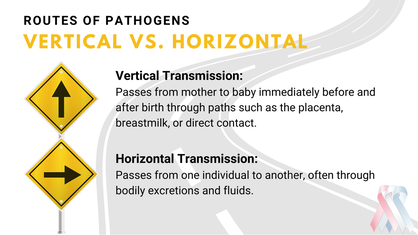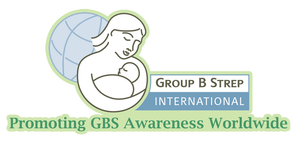How do I get GBS?
GBS is a type of bacteria that is naturally found in the digestive and lower reproductive tracts of both men and women. The normal microbial flora is relatively stable, with some types populating various body regions during particular periods in an individual's life. Most babies get their first big dose of microbes at birth, while traveling through the birth canal, then pick up more while breastfeeding.
It is important to note that carrying or being colonized with GBS does not mean you have an infection. Colonization is the presence of GBS but infection is when it can cause harm through invasive disease. GBS colonization is often harmless in adults; however, when it spreads to babies it may cause infection.
Babies can be infected by GBS before birth through several months of age due to their underdeveloped immune systems. According to the CDC, in adults, most cases of GBS disease are among those who have other medical conditions. Other medical conditions that puts adults at increased risk include:
Risk for serious GBS disease also increases as people get older. Adults 65 years and older are at increased risk compared to adults under 65 years old. GBS also disproportionately affects African American mothers and their babies who are twice as likely to be affected by GBS than their white counterparts. Smoking is also a factor that is known to increase risk for GBS colonization.
It is important to note that carrying or being colonized with GBS does not mean you have an infection. Colonization is the presence of GBS but infection is when it can cause harm through invasive disease. GBS colonization is often harmless in adults; however, when it spreads to babies it may cause infection.
Babies can be infected by GBS before birth through several months of age due to their underdeveloped immune systems. According to the CDC, in adults, most cases of GBS disease are among those who have other medical conditions. Other medical conditions that puts adults at increased risk include:
- Diabetes
- Heart disease
- Congestive heart failure
- Cancer or history of cancer
- Obesity
Risk for serious GBS disease also increases as people get older. Adults 65 years and older are at increased risk compared to adults under 65 years old. GBS also disproportionately affects African American mothers and their babies who are twice as likely to be affected by GBS than their white counterparts. Smoking is also a factor that is known to increase risk for GBS colonization.
How does my baby get GBS?
There are two routes GBS can take - vertical and horizontal. Vertical transmission is when pathogens (like GBS) pass from mother to baby immediately before and after birth through paths such as the placenta, breastmilk, or direct contact - i.e., a mother passes down the pathogens to the baby. Horizontal transmission is when pathogens pass from one individual to another, often through bodily excretions and fluids - i.e., similar to how you catch a cold from someone.

Prenatal-onset (before birth) and early-onset (from birth to 6 days old) GBS disease are typically spread through vertical transmission, from mother to baby. Unnecessary, frequent, or forceful internal exams may push GBS closer to your baby.
Late-onset GBS disease occurs in babies 1 week of age up to several months old. Once born, GBS disease can be caused by sources other than the mother - i.e., horizontal transmission. There are currently no prevention protocols in place to help prevent late-onset GBS disease. However, being able to recognize the signs of GBS infection in babies is imperative for prompt medical treatment for better outcomes. Handwashing is also a great strategy to help ebb the spread of germs.
Late-onset GBS disease occurs in babies 1 week of age up to several months old. Once born, GBS disease can be caused by sources other than the mother - i.e., horizontal transmission. There are currently no prevention protocols in place to help prevent late-onset GBS disease. However, being able to recognize the signs of GBS infection in babies is imperative for prompt medical treatment for better outcomes. Handwashing is also a great strategy to help ebb the spread of germs.
How can I help prevent infection in my baby?
The first towards prevention is awareness. Make sure you, your care team, and those who will be taking care of your baby are aware of GBS.
GBS Testing
Knowing your GBS status can help you and your healthcare providers take adequate steps to help protect your baby. Learn more about GBS testing
Decreasing Colonization Levels
If you have urinary tract infection (UTI) symptoms or a significant level of GBS in your urine during pregnancy, your healthcare provider should prescribe oral antibiotics at the time of diagnosis. We advocate for a recheck ("test of cure") one month after treatment.
Know that “alternative medicine” treatments such as garlic or tea tree oil have not been proven to prevent your baby from becoming infected or permanently decreasing GBS colonization. Some alternative treatments may be unsafe. While some may have other health benefits, they should not be used as a replacement for traditional medicine when treating GBS. Please note that GBS is a transient type of bacteria, meaning that a pregnant person could test negative, but be colonized later in pregnancy and vice versa. Probiotic use to decrease GBS colonization is currently being researched with promising results.
If you have tested positive for GBS in your urine or your swab test, you are considered GBS+ for that pregnancy. This means you should receive IV antibiotics during labor and delivery to help reduce your colonization as your baby is born to reduce the risk of vertical transmission.
Know that “alternative medicine” treatments such as garlic or tea tree oil have not been proven to prevent your baby from becoming infected or permanently decreasing GBS colonization. Some alternative treatments may be unsafe. While some may have other health benefits, they should not be used as a replacement for traditional medicine when treating GBS. Please note that GBS is a transient type of bacteria, meaning that a pregnant person could test negative, but be colonized later in pregnancy and vice versa. Probiotic use to decrease GBS colonization is currently being researched with promising results.
If you have tested positive for GBS in your urine or your swab test, you are considered GBS+ for that pregnancy. This means you should receive IV antibiotics during labor and delivery to help reduce your colonization as your baby is born to reduce the risk of vertical transmission.
A GBS Vaccine
While still in clinical trials and undergoing testing, the hope is that a GBS vaccine given to pregnant individuals will help protect babies from GBS even before they are born. The vaccine does not contain the bacteria itself, instead it contains proteins or sugars to help the signal the immune system to make antibodies that the baby receives in the womb. This helps the baby fight off any GBS they may encounter. Learn more about the GBS vaccine
Know the Signs of Infection
Unfortunately, with current prevention protocols, not all infections can be prevented - even if you've tested negative! That's why knowing and recognizing the signs of invasive GBS disease (iGBS) is so important - they're often your first defense. GBS is a fast-acting type of bacteria, so if you notice any of the signs of infection in your baby, contact your health care provider immediately! Learn about the signs of GBS
Join the Campaign against GBS Disease in babies! |
CONNECT TO GBSI |
